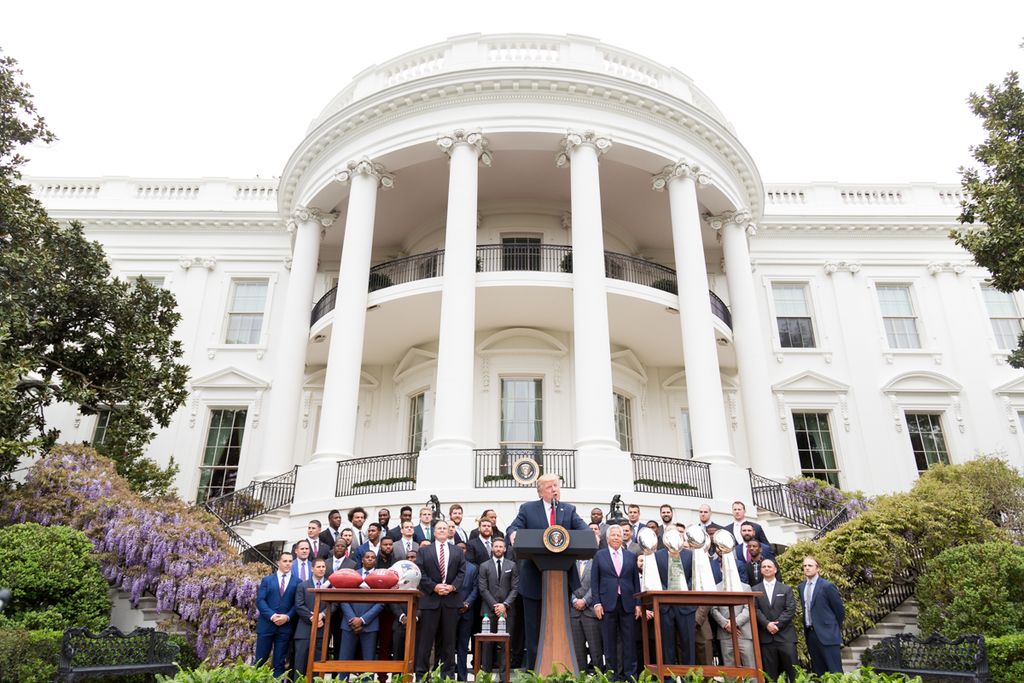From questioning President Obama’s American citizenship to disparaging his black employees; from discriminating against black tenants to refusing to condemn white supremacists, Donald Trump has made a career of engaging in and exploiting racism and bigotry. His recent attack on the mostly black NFL players who kneel during the national anthem is just the latest example of this. Yet just before his infamous “son of a bitch” line, Trump made another comment with equally racist undertones. He complained that the NFL was “ruining the game” by penalizing violent plays like helmet-to-helmet hits. “Today if you hit too hard—‘15 yards! Throw him out of the game!’” Trump groused, continuing: “That’s what [football players] want to do. They want to hit! It is hurting the game.”
Trump’s remarks fit neatly into white America’s long history of stripping black athletes of their agency and turning them into objects of entertainment and fetishization. Instead of advocating for more protections for football players—the overwhelming majority of whom are black—Trump has criticized the league for doing so. To Trump, football players exist for the sole purpose of entertainment, and more violence makes for a more entertaining game.
While Trump derides the game as soft, football remains a dangerous sport. For evidence, one only needs to look to last Thursday’s game, during which Green Bay wide receiver Davante Adams was knocked unconscious by a helmet-to-helmet hit. In fact, the rate of concussions suffered by players, despite decreasing slightly from 2015 to 2016, are still much higher than they were in 2013 and 2014. And a growing body of research shows that the repeated hits football players suffer lead to serious long-term health problems like C.T.E., a degenerative disease which can cause memory loss, impaired judgment, and dementia. Many players have already resigned themselves to the fact that they likely have C.T.E., and some have chosen to retire early because of the risks of C.T.E.
Despite the overwhelming evidence that football is dangerous, Trump has consistently bemoaned the perceived decline in violence in the NFL. At one January 2016 rally, he lamented, “Football has become soft, like our country has become soft.” At another rally in October, Trump mocked the league’s new concussion protocol: “Uh oh, got a little ding on the head? No, no, you can’t play for the rest of the season.” Over a three-week span in October 2014, Trump tweeted that the NFL was too “boring” or “soft” six times (during that span, NFL players suffered 16 visible concussions, according to a weekly list kept by Esquire). Trump’s dismissal of the health concerns football poses and his insistence that players actually “want to hit” reveals his retrograde ideas about the role of sports in American society.
Black athletes have long been painted by whites as violent brutes and savages. In 1936, the white columnist Westbrook Pegler wrote that whenever a black athlete runs, “his civilization vanishes and he becomes again for the moment an African savage in breechcloth and nose ring legging it through the jungle.” The use of black athletic bodies for white entertainment dates back to the late 19th century, when black people would compete in “battle royals” for white audiences during which they would often be blindfolded or have an arm tied behind their back.
This tradition continues today with the portrayal of black athletes like LeBron James and Serena Williams as unthinking muscle machines. Sports journalists consistently write about white athletes in ways that emphasize their intellect and black athletes in terms of their athleticism. Whenever a black athlete exercises agency—by boasting about their prowess, retaliating against racism, or taking a political stand—white retribution is swift. A common refrain by white commentators after the NFL protests was that the black athletes protesting were “ungrateful,” “arrogant,” or “entitled,” as if their success is due to the generosity of white Americans, rather than in spite of their racism.
In a recent essay for the Atlantic, Ta-Nehisi Coates described Donald Trump as the “first white president,” arguing that his ideology is fundamentally based on white supremacy. Trump’s elevation of his own viewing pleasure over the safety of hundreds of black football players is part of that ideology. It is an appeal to a time when black athletes refrained from political protests and existed solely to violently spar with each other for a white audience; a time when, according to Trump, America was “great.”
Image Credit: Wikimedia Commons / The White House
